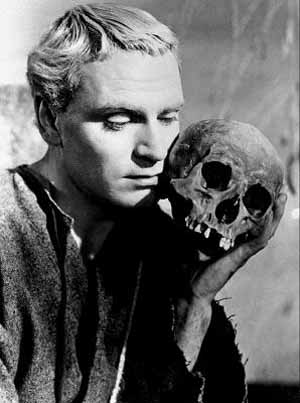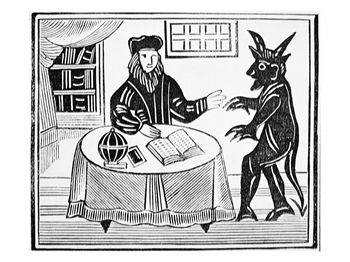"If I cannot follow where you go / I promise to teach what I have learned."Oh man, Jump Little Children were so freakin' great. This song is particularly heartwrenching, and it totally nails that often elusive songwriting balance between wonderfully vague and unflinchingly direct.
Here's the backstory:
The lead singer's father has just died. In mourning, the singer (we'll call him Matt, because -- well -- that's his name) writes a song -- a "bittersweet melody." He "long[s] for that embrace, the strongest arms / that troubled face" that made [him] feel safe." And he begs the recently departed to "leave [him] some words of wisdom" as he tries to make sense of this new life alone.
Clearly, he's not taking this too well.
So basically, this entire piece is really just one big old eulogy for dear old dad, right?
 Hamlet: You rang?!?
Hamlet: You rang?!?Maybe, maybe not.
See, like the best works of literature, a really well-written pop song actually lends itself to a wide array of thematic interpretations. Hamlet isn't *just* about doing right by your dead father. It's about finding one's place in the world. It's about searching within one's self for the answer to that all-important question posed in the very first lines of the play ("Who's there?"). And it's about taking the necessary time to discover what it means "To be, or not to be."
Now sure, as is the case with great literary analysis, there's an "acceptable range" of what all a song *can* and *cannot* mean (example: when our buddy Matt sings "if I cannot follow where you go, I promise to teach what I have learned" -- he's probably not talking about eeking out life-lessons while tailing some dude on his way to a one-stall men's room. Well okay, maybe). But by and large? The songwriter has pretty much laid bare some universal themes here, and now it's up to us, the audience, to make sense of things.
So let's do exactly that. And since we're obviously dealing with some heavy subject matter, let's do it by looking at this song as it relates to the similarly universal themes on human suffering and sadness, as once so famously put forth in the ever-handy "Kübler-Ross model" (a.k.a. -- the five stages of grief).
Take it away, Wikipedia-level understanding of advanced psychological theories!
Anger: ("Fortune smiles with teeth of jade, and the greediest eyes")Translation: "Greed. Argh! Boy, I'm pissed that you've been stolen away from me."Hey cool.
Denial: ("How do years so far away so suddenly evaporate?")Translation: "Man, I can't believe this is actually happening."
Bargaining: ("If you will go and not return / leave me some words of wisdom.")Translation: "Go if you must, but please -- one last thing before you do..."
Depression: ("Who was it that said to me / that heroes would live forever?")Translation: "I'm a sad panda."
Acceptance: (If I cannot follow where you go, I promise to teach what I have learned.")Translation: "Well, ok then. This sucks and it'll take time, but I'll try."
The figurative language opens the song up so well that the songwriter's once intensely personal eulogy for his late father actually becomes a broader commentary on the universal themes of life, love, and loss. Suddenly (just like Hamlet), we're not just talking about the simple case of some dude who's trying to make peace with his dead father anymore.
You want to follow, but you know you can't.
You've given your all, but still you're left standing all alone.
And even though you might well have accepted that things simply had to change, you're certainly not over it -- no sir, not by a longshot.
(Damned ear poison)
Wow. This just got deep in a hurry. Infinitely more universal, too. Heck, when you look at it *that* way -- one might even call this a tailor-made breakup song. And for a track that doesn't once mention the word "love" -- that's quite a feat. Crazy, right?
Yay figurative language!
(... now get thee to a nunnery...)



